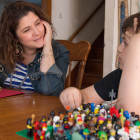Disparities
Post Sandy Hook: Building A Network To Address Childhood Trauma
|
Connecticut has made significant gains to create a system that better identifies and treats children suffering from traumatic stress in the year since the tragedy at Sandy Hook Elementary School. But ensuring children have equal access to mental health services regardless of where they live or their insurance status remains elusive. “The impact of trauma on children is a public health issue. It’s happening all over the state and it’s not just high-profile events such as Sandy Hook,” said Robert Franks, vice president of the Child Health and Development Institute, noting that 25,000 children per year experience significant traumatic events. “Children are exposed to all sorts of trauma in their homes and communities every day.
